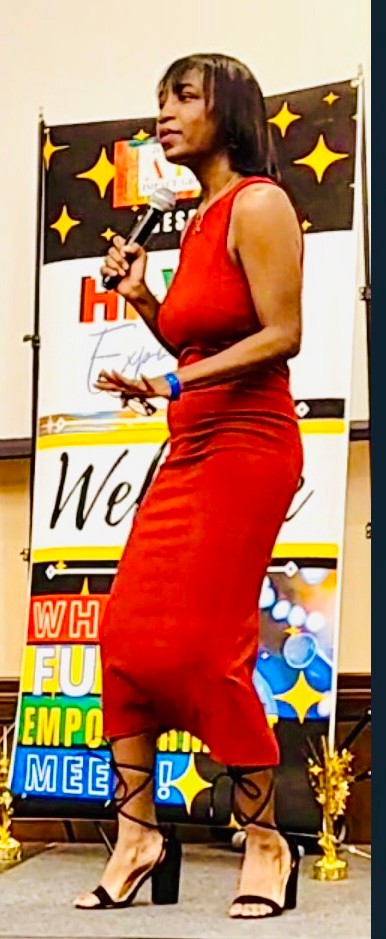We’re excited to introduce you to the always interesting and insightful Michele Johnson. We hope you’ll enjoy our conversation with Michele below.
Alright, Michele thanks for taking the time to share your stories and insights with us today. Let’s start with the story of your mission. What should we know?
Working as a Duke trained Physician Assistant in Family Medicine, I initially believed the connections I made with patients to get to root cause stressors in their lives that resulted in health changes was my mission. Many days 5 or more patients cried with me about the mounting difficulties of managing work, family responsibilities and trying to eat well and exercise. Reading the National Stress Institute statistic that 77% of doctor visits are the result of stress related illness rang true in my everyday professional experience. As a certified professional life coach, I went after impacting more people with the skills and techniques to be resilient against stress effects on the body that worked for me and my patients. I taught groups interested in managing the mental effects of chronic illness, overwhelm and burnout in successful professionals, and minority groups suffering the effects of violence readily shown on all public media and micro-aggressions at work.
My mission is so personal and rewarding. The impact of researching the best ways to relieve my physical and emotional stress drastically improved my chronic pain illness. This knowledge led to an impact in my exam rooms, and now organizations experiencing the effects of the Great Resignation, burnt out employees, and declining performance due to poor internal communications and mounting stress are experiencing real solutions that work to transform company culture.

As always, we appreciate you sharing your insights and we’ve got a few more questions for you, but before we get to all of that can you take a minute to introduce yourself and give our readers some of your background and context?
I empower executive teams and leaders to step into stress resilience and take the “stress” out of difficult conversations at work. My background in corporate customer service training and practice as a physician assistant in family medicine has exposed the impact of having reliable skills and techniques that can really change company culture and individual performance.
Today as a practicing physician assistant, international best-selling author, speaker and corporate stress strategist, I love what I have the opportunity to do. I have the honor of helping teams feel empowered to manage their health, bounce back from stressors, and have their organization support a culture of listening compassionately and still meeting company goals.
It wasn’t always this way. At age 23, diagnosed with an incurable chronic pain illness, I had to learn wellness physically, emotionally and gain a clear purpose. As one of my executive coaching clients mentioned “managing my stress, IS managing my illness. ” This principle has driven how I was able to thrive, despite challenging physical limitations, to help others be empowered in their mental and physical wellness.
I work with organizations through group training programs, corporate retreats & workshops, team building experiential learning and stress strategy intensives. Empowering resilient leaders and facilitating conversations on resolving conflict, diversity and inclusion and harassment at work has created a harmonious solution to a pressing people challenge facing many organizations today.
What sets us apart is our attention to listening. Our process of assessing the root cause stressor of your organization and then cocreating a customized solution assures a stress care solution that will transform your teams and company culture. Past clients have had lasting effects from our trainings and reach out to explore ways we can work together again.
This process of customizing a solution to fit your company’s stress challenge is what makes me most proud of the work I do. Nothing is one size fits all, strategizing best practices for your organizations specific needs is a distinguishing factor.
What’s a lesson you had to unlearn and what’s the backstory?
I had to unlearn the lesson of being a Human Doing instead of a Human Being.
Working fulltime as a medical professional, being an entrepreneur, speaker, coach and consultant, wife, mother and riding the changes of a chronic pain illness was a recipe for a busy and stress filled life. My ambition to get the message out about the effects of stress and repressed emotions was all consuming.
I attempted to engage in various social media platforms, I posted daily videos, emailed my list of coaching clients, drafted and published an international bestseller in 9 months while working 2 jobs and occasionally traveling or spending time with my family. I knew I was stressed and had been planning a getaway in a couple of weeks when it happened. After not having much of an appetite, I tried to eat applesauce. Shortly after it came up, I realized I had to make a doctor’s appointment. The scale showed a 40lbs loss and now, I couldn’t keep down applesauce.
The labs, the alarming symptoms, the test after test and missing weeks of work forced some reflection on what I could do to help myself. My husband and I finalized all our end-of-life paperwork as the doctors and specialists could not come to a diagnosis. With my training and expertise, I used the skills I have helped my clients use, I sought help and coaching and attended a life shifting women’s retreat.
Today I have regained 20lbs, I feel great and have embraced slowing down the doing to embrace being. Many times, there is programming in our minds that make us feel we are not enough just being, we have to do something of value, we have to serve others, burn the midnight oil on our work – all to Be ENOUGH. I learned the truth that by being reflective and true to the opportunities that use my natural gifts and expertise – I don’t have to chase down opportunities that are likely not the best fit for me anyway. It is working, and as I train others, I am excited to watch their programming change too.
How do you keep your team’s morale high?
Creating a mental “safe space” for your team and fostering a sense of true community is vital for today’s teams to be productive and continue to buy in to the organization’s mission. When team members feel heard and appreciated for the value they add, the culture creates a winning environment.
Some practical advice on how to achieve a mental “safe space” of inclusivity includes:
– Listening to team member concerns – sometimes senior leadership does not get to hear frontline member concerns as middle management leaders attempt to shoulder the responsibility of responding to those Hearing all aspects of a problem can lead to a winning solution for everyone involved – and heard members are happy members who will go after doing their best for their organization.
– Allowing for domain working groups and committees to bring up best practices for team inclusivity and increasing morale. Be the leader to suggest this and trust your teams to generate great ideas to move the organization forward and maintain mental wellness that works for your unique circumstances.
– Many team members are doing solo work whether remote or in person. During the Great Reshuffle, many have just started at a new organization during the pandemic. In order to establish and maintain high morale, it can be helpful to have team building in person or virtual sessions to foster community and belonging. A cooking class, trivia, work related experiential learning retreats. The options are truly endless. When I cocreate these with clients, participants talk about these as refreshing and memorable events with family and new perspectives on colleagues – new bonds.
Contact Info:
- Website: www.thepainfreepa.biz
- Instagram: https://www.instagram.com/thepainfreepa/
- Facebook: https://www.facebook.com/painfreepa/posts/275934007154795pain
- Linkedin: https://www.linkedin.com/in/michele-johnson-mhs-pa-c-5a02b01b
- Youtube: https://www.youtube.com/channel/UCcCNBodsXfNL3MOG4O8XzJA


